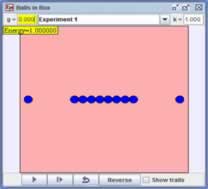

We study ODE event driven models and show how they can be used to detect hard disk collisions in models such as the ideal gas and Newton's cradle. We also introduce discrete maps and Poincare sections.
The Balls In Box Model shows that the phase-space trajectory of a system of particles is very sensitive to its initial conditions. In general, an isolated system of many particles that is prepared in a nonrandom configuration will change in time so as to approach its most random configuration where it is in equilibrium. What happens if we choose the initial conditions in a very special way?
The default initial condition corresponds to eight stationary particles perfectly aligned on the x-axis. Two particles approach from the left and the right. What happens when these particles collide with the eight stationary particles? The Ejs model solves Newton's second law of motion numerically but pauses when a collision is detected. This is called an Ejs event. Conservation of energy and momentum are applied at the event and the simulation is resumed.
Gould and Tobochnik Statistic and Thermal Physics p19 to be published by Princeton University Press (2010). Draft chapters are available online at <http://stp.clarku.edu/>.
The following models use ODE events to detect collisions between hard objects (disks or spheres).
Additional models may be be posted for self-study.
The Balls In Box Model was created by Francisco Esquembre and Wolfgang Christian using the Easy Java Simulations (EJS) modeling tool. It is based, in part, on a Java program from the Statistical and Thermal Physics Project. You can examine and modify this compiled EJS model if you run the model (double click on the model's jar file), right-click within a plot, and select "Open Ejs Model" from the pop-up menu. You must, of course, have EJS installed on your computer.
Information about Ejs is available at: <http://www.um.es/fem/Ejs/> and in the OSP comPADRE collection <http://www.compadre.org/OSP/>.